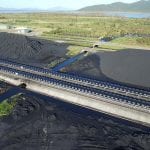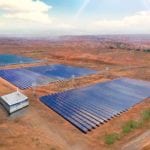Around The Web
Eastern China still producing illegal ozone-depleting CFC gas
Eastern China pinpointed as source of rogue ozone-depleting emissions
WCI auction sets new record, but still at a discount to secondary market
Budj Bim Indigenous eel trap site on verge of world heritage listing
Aquaculture network in Victoria, maintained over 6,600 years, faces final step in recognition process
A 6,600-year-old, highly sophisticated aquaculture system developed by the Gunditjmara people will be formally considered for a place on the Unesco world heritage list and, if successful, would become the first Australian site listed exclusively for its Aboriginal cultural value.
Known as the Budj Bim cultural landscape, the site in south-west Victoria is home to a long dormant volcano, which was the source of the Tyrendarra lava flow.
Continue reading...Air pollution, ill health and the need for a 21st-century Model T Ford | Letters
The harmful effects of air pollution during early life deserve greater attention (Air pollution damages ‘every organ in the body’, 18 May). Ongoing research in the US has reported that exposure during pregnancy to polycyclic aromatic hydrocarbons (PAHs), a constituent of diesel exhaust, is linked to developmental delay at three years, an IQ reduction of 4-5 points at five years, increased anxiety, depression and inattention at six to seven years, a reduction in surface white matter in the brain at eight years, and delayed self-regulatory behaviour which became most significant at 11 years. These data are “preliminary” only in the sense that they have not yet been replicated. Benzo-a-pyrene (BaP) is the only PAH routinely monitored by the EU. Due to the rapid growth in the sale of diesel vehicles since 2000, levels of BaP at traffic-monitoring sites has increased by 52%.
These findings have huge implications for public health, educational attainment and the high level of mental health problems currently afflicting schoolchildren in the UK. It is beyond belief that the government’s only response is a vague commitment to halve the number of people exposed to levels above the WHO limit for small particulates by 2025. This is not even a target; it is an aspiration that is legally unenforceable.
Dr Robin Russell-Jones Scientific adviser, Geraint Davies MP Chair, all-party parliamentary group on air pollution
British Steel collapses to leave UK government’s ETS loan payback in doubt
White stork pair could become first to breed in wild in UK for centuries
Birds brooding three eggs due to hatch in June are part of a rewilding project
White storks nesting on top of an ancient oak tree could become the first wild pair to successfully breed in Britain for hundreds of years.
The enormous birds are brooding three eggs on the rewilded Knepp estate, in Sussex, as part of a project to reintroduce the species to south-east England.
Continue reading...EU ignoring climate crisis with livestock farm subsidies, campaigners warn
Billions of euros spent on supporting climate-intensive meat and dairy farms, which have shown no drop in emissions since 2010
The EU is disregarding the climate emergency by continuing to give out billions of euros in subsidies to climate-intensive livestock farms at the same time as promising to cut emissions, say campaigners.
Under the Paris climate agreement, the EU and its member states have committed to reduce emissions in the European Union by at least 40% by 2030. The EU’s farming sector has shown no decline in emissions since 2010, with meat and dairy estimated to be responsible for 12-17% of total greenhouse gas emissions.
Continue reading...Much shorter working weeks needed to tackle climate crisis – study
UK workers must move to nine-hour week if carbon levels do not change, says thinktank
People across Europe will need to work drastically fewer hours to avoid disastrous climate heating unless there is a radical decarbonising of the economy, according to a new study.
The research, from thinktank Autonomy, shows that workers in the UK would need to move to nine-hour weeks to keep the country on track to avoid more than 2C of heating at current carbon intensity levels. Similar reductions were found to be necessary in Sweden and Germany.
Continue reading...Plastic straws: Which companies are banning them?
Whitsundays Mayor says he can't wait for Adani mine to start operating
With the LNP returned to power, is there anything left in Adani's way?
Qld Govt, Adani, tripping over themselves to approve Carmichael coal mine
 The Queensland Government and Adani have issued each other new deadlines as both seek to expedite coal mine approvals
The Queensland Government and Adani have issued each other new deadlines as both seek to expedite coal mine approvals
The post Qld Govt, Adani, tripping over themselves to approve Carmichael coal mine appeared first on RenewEconomy.
Ausgrid seeks to expand virtual power plant to cut back on network costs
 Network operator Ausgrid seeking proposals to expand its virtual power plant, targeting the estimated 5,000 batteries within its network and help defray investment costs.
Network operator Ausgrid seeking proposals to expand its virtual power plant, targeting the estimated 5,000 batteries within its network and help defray investment costs.
The post Ausgrid seeks to expand virtual power plant to cut back on network costs appeared first on RenewEconomy.
Floods in 2009 and 2015 were worst in Cumbria for centuries – study
Analysis in north-west England linked to evidence of UK’s vulnerability to climate crisis
The floods of 2009 and 2015 in north-west England were the worst for more than 550 years, according to groundbreaking analysis of lake sediment in the region.
Residents have long suspected that the devastating floods were the worst in living memory, but this confirmation – from an analysis of lake sediment layers – provides a unique window on to the history of flooding in one of the wettest parts of England, and reveals the global climate crisis.
Continue reading...Plastic straws, cotton buds and drink stirrers to be banned in England
Government confirms ban on sale and use of items from April next year
Plastic straws and drink stirrers, and cotton buds with plastic stems will be banned from sale and use in England from next April, the government has confirmed.
The move, which has been in the offing for more than a year, is hoped to vastly reduce the litter and other environmental impacts of the nearly 5bn plastic straws currently used each year in the UK, along with more than 300m plastic stirrers and close to 2bn cotton buds with plastic stems.
Continue reading...Battle for Labor leadership is a battle for Labor’s future climate policy
 The Labor leadership contest shapes up as a battle for the future of climate policy and as contest between pragmatism and ambition.
The Labor leadership contest shapes up as a battle for the future of climate policy and as contest between pragmatism and ambition.
The post Battle for Labor leadership is a battle for Labor’s future climate policy appeared first on RenewEconomy.
Bendigo gold miner plans 60MW solar farm on old evaporation ponds
 Gold miner GBM Gold plans 60MW solar farm, including a floating solar element, on old evaporation ponds near Bendigo.
Gold miner GBM Gold plans 60MW solar farm, including a floating solar element, on old evaporation ponds near Bendigo.
The post Bendigo gold miner plans 60MW solar farm on old evaporation ponds appeared first on RenewEconomy.
UK government to bring in new controls on plastic items
Deloitte seeks offers for Lyon Group’s solar and storage projects
 Deloitte seeks expressions of interest for three large solar and battery storage projects owned by Lyon Group companies.
Deloitte seeks expressions of interest for three large solar and battery storage projects owned by Lyon Group companies.
The post Deloitte seeks offers for Lyon Group’s solar and storage projects appeared first on RenewEconomy.



